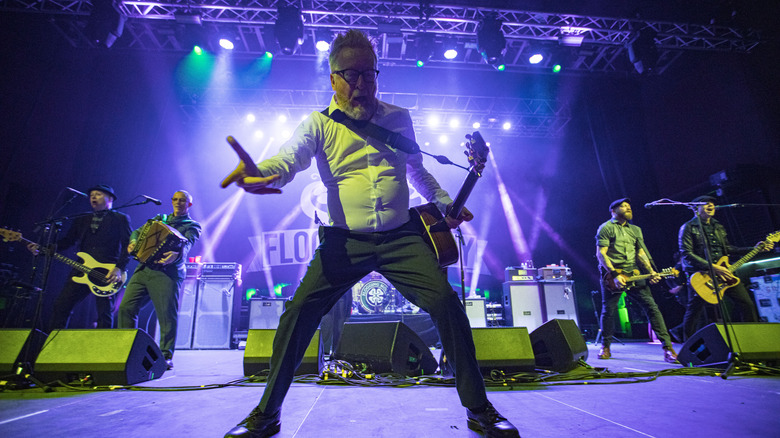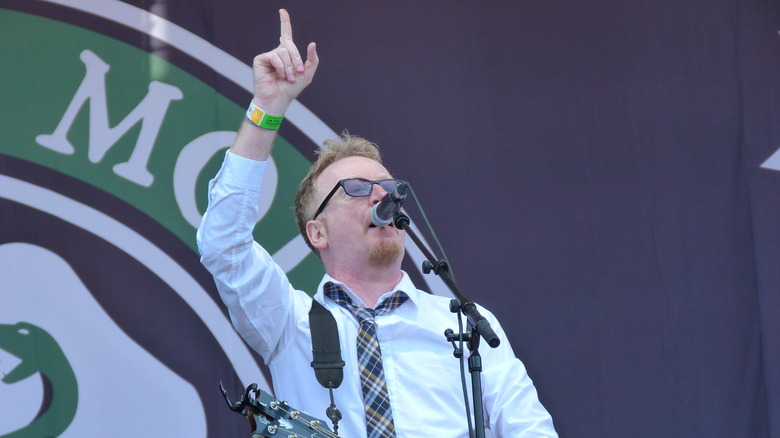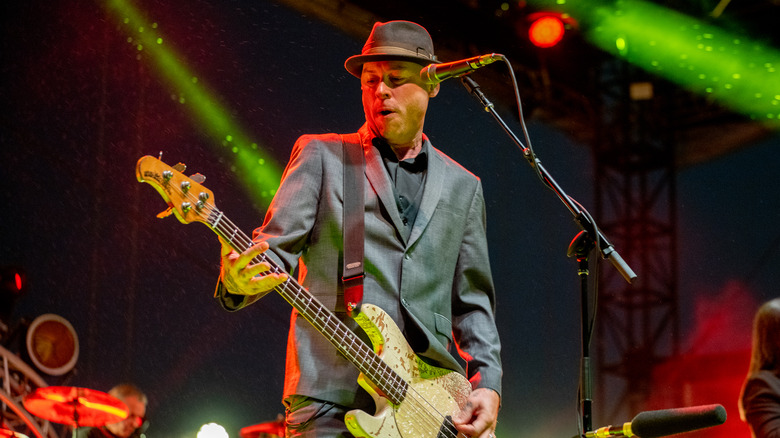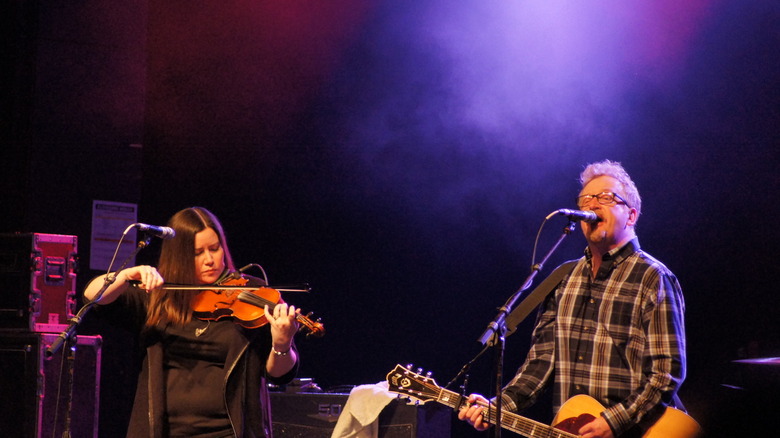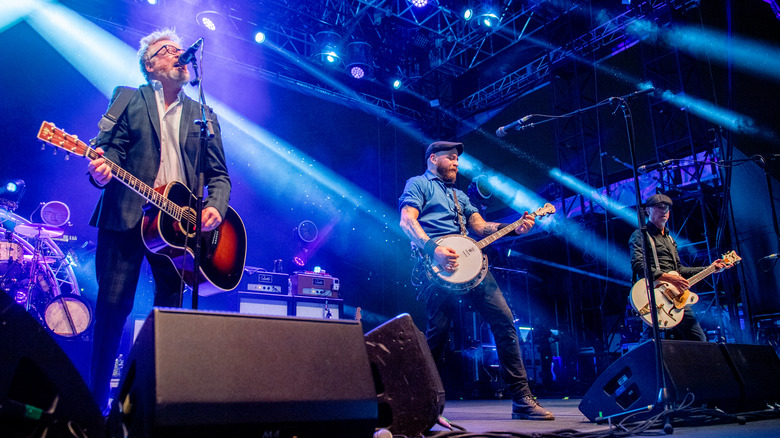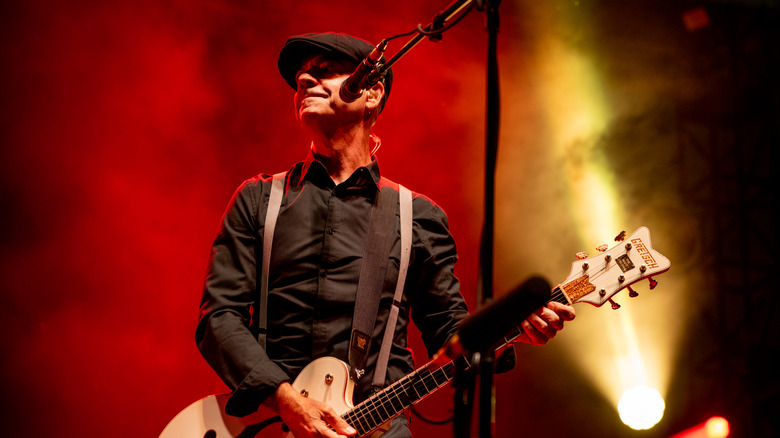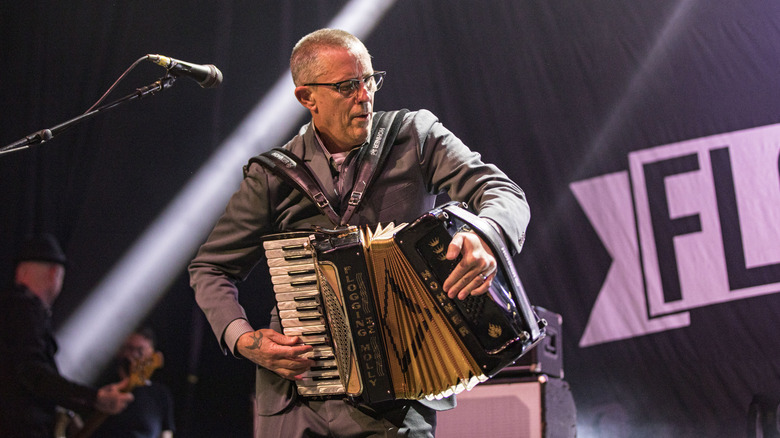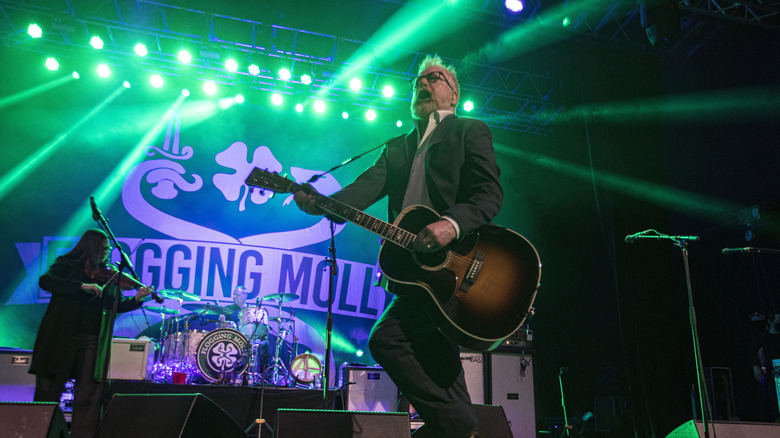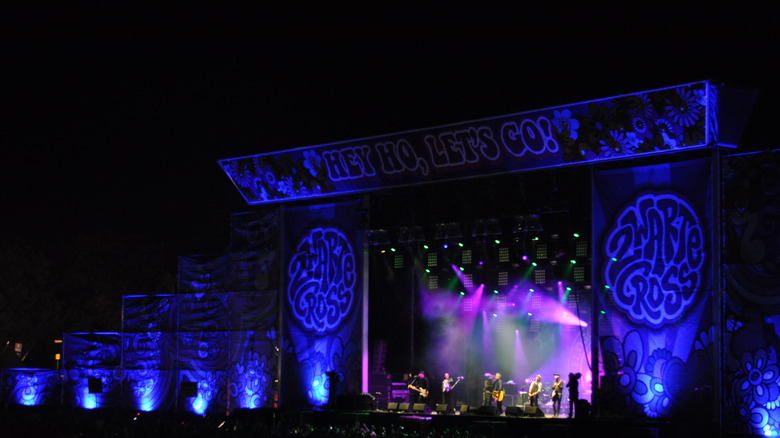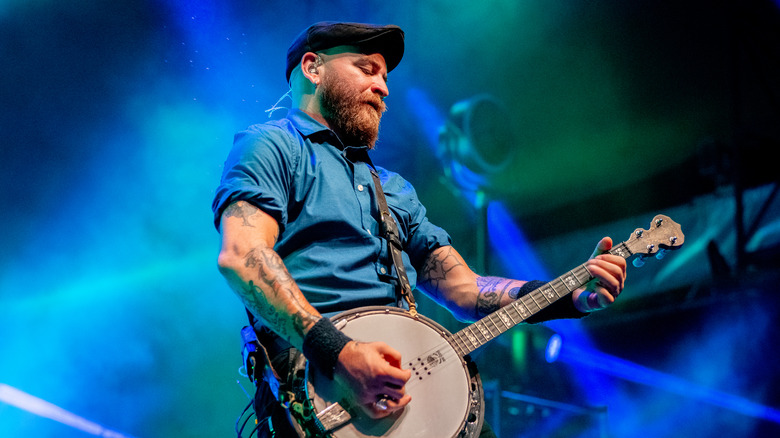The Untold Truth Of Flogging Molly
Flogging Molly is a Celtic punk band from the city of — wait for it — Los Angeles. Yeah, wouldn't have guessed it, right? Irish vocalist Dave King was really interested in bringing traditional Irish instruments in to mix with a punk sound, so when he was living in L.A., he pitched the concept to his label, Epic Records, who unfortunately weren't on board. King then left them behind and started his own band: Flogging Molly, so named because of the bar where they got their start.
Flogging Molly began in the 1990s and continued strong despite not being allowed to play anywhere but the United States for several years. A few members left the band, and the music industry didn't think their musical ideas were going to work. Ultimately, the band proved everyone wrong and released their seventh album, "Anthem," in 2022.
Despite not having much of a following in Ireland itself (via Hot Press), King's roots show with just about every song they play; Flogging Molly has a robust collection of songs about Ireland, the Catholic Church, drinking, love, and death. He has also written fairly extensively about his father, as he died when King was a young child. Let's learn more about this U.S.-born Celtic punk band that plays traditional Irish instruments where and when no one else would, gaining worldwide success while doing it.
Vocalist Dave King started the band after friction with his record label
Dave King (above) was always interested in combining different types of music that ordinarily wouldn't be put together in a band; for example, punk rock and traditional Irish instruments like mandolins and tin whistles. While growing up in Ireland, King's parents ran traditional musical sessions in their home, and the memories stuck with him (via The Irish News).
Living in Los Angeles in the late 1980s, King was part of the heavy metal band Fastway, as well as Katmandu, a more experimental metal band, writes the San Diego Reader. He eventually broke off to start a solo career with a new label. King told The Irish News in 2018: "It [the 1980s music biz] was like prostitution, it was just horrible, it really was. I knew from very early on that I wasn't meant to be in a 'business band.'"
Said label, Epic Records, wasn't on board with him bringing in traditional Irish instruments, and therefore King left the deal. He ended up meeting Bridget Regan — who played the fiddle and was interested in his idea — at the Los Angeles bar Molly Malone's, and the rest is history. King said that before he started Flogging Molly (via The Irish News), "I just wanted to be able to sit in a room on my own and play a song and move myself with what I'd just done – and I'd never ever done that before."
They took their name from the first bar that supported them
Flogging Molly got their start playing every week as a resident band in Molly Malone's. They played for years before even trying to make a record, simply because they didn't have the money. Originally, it was Dave King, Bridget Regan, and a group of friends he happened to meet by chance. After meeting Regan by accident, King said (via The Irish News): "I met everybody in the band like that. It was just all luck, it grew together very naturally. And we loved what we were playing."
King and Regan, who played the fiddle, actually met at the bar, and years later, the band put out their first album, recorded live at Molly Malone's and titled "Alive Behind the Green Door." According to King (via Hot Press), "We put two microphones in Molly Malone's, one on the stage and one on the crowd, and we recorded a live album. We were hoping that we'd be able to get enough money through that to make an actual studio album. And then, the next thing you know, we're up in Chicago with Steve Albini. It's just ridiculous." Through their residency, they had evidently cultivated a local fanbase.
As Dave King put it to Kerrang! (per San Diego Reader), "We used to play there every Monday night and we felt like we were flogging it to death, so we called the band Flogging Molly."
Lead singer Dave King married Bridget Regan in 2008
Fiddle player Bridget Regan was the first person Dave King met when he was figuring out his own musical sound after having gone completely solo and sans his record deal. According to Hot Press, King said, "Musically, I didn't really know where I was going, I was painting houses, and doing whatever I could do. Then Bridget told me that she played the fiddle. The next day, I went over to her apartment, and she started playing over the songs I already had."
King and Regan married while on tour in Japan for the album "Float" in 2008 (via The Vogue). They'd been playing music together for 12 years at that point. These days, they live in Wexford, Ireland. Even if they don't have as much of a fanbase there as they do in other places, it's home. Throughout the COVID-19 pandemic, the couple continued to record music together first before bringing in the rest of the band. King said via Hot Press, "Myself and Bridget will record a verse, a bridge, a chorus and maybe a middle 8 — something really loose. And then we'll send it to the rest of the band, so that they have room to make suggestions."
Flogging Molly has hosted a Caribbean cruise since 2015
Even during the first few years of being a band, the members of Flogging Molly spoke about getting a pirate ship and sailing to different ports, according to accordionist Matt Hensley (via Thrasher Magazine). Of course, actually paying for such a ship would be an astronomical amount of money, so after hearing about — and, in Hensley's case, going on — Damian Marley's Jamrock Reggae Cruise, they brainstormed the concept that would become their Caribbean Salty Dog Cruise.
Said cruise began in 2015 and runs for several days a year, always making sure not to take the same route twice. Flogging Molly handpicks each band that plays, doing its best to make sure every inch of the ship really feels like a punk rock pirate ship. Fans have gone on repeat cruises and frequently gift Hensley with guitar picks and patches. As Hensley is a skateboarder as well as a musician, there have been skateboarding ramps on board; Hensley is everywhere at once, playing requested songs with various bands while also getting some skateboarding time in. Proud of the band's success, Hensley said (via Thrasher Magazine), "People keep coming back so I know we're doing something right and it feels great, you know?"
They were influenced by everything from folk to country to rock
As a punk rock band with genuine Irish instruments, Flogging Molly has had several different musical influences. Flogging Molly counts among its influences country singer-songwriter Johnny Cash, Irish folk band the Dubliners, and rock band the Clash. Vocalist Dave King has always listened to a bunch of different genres one after another. He said of his former bandmates in Fastway (via Cincinnati CityBeat), "They just couldn't understand it. I could listen to David Bowie and then listen to Dubliners, no sweat. I truly feel that Irish music was always punk rock music to me. It might not have had the electric guitars and drums and bass, but it had the emotion."
King told Kerrang! that the traditional Irish bands that have influenced them have all learned from each other. "The Pogues wouldn't be who they were without The Dubliners. Likewise, The Dubliners without The Clancy Brothers. That Irish traditional sound was so important because it was very much the soul of the band," he said. As they continued to release albums, King made sure to not simply repeat what they had done before. He took all their different influences (in the case of the album "Within a Mile of Home," the rock band Led Zeppelin, Irish band Planxty, and the Clash) and made sure to run with them all in different directions.
At the beginning, Flogging Molly couldn't tour outside the U.S.
When Flogging Molly first began touring, vocalist Dave King had a 01 Visa for the U.S. when the laws were being changed. He was originally invited to work in Los Angeles on an artists' visa and had been told by a lawyer a few years earlier that he could simply renew the visa when it expired. That was not the case after the visa laws changed because if he left the U.S., he wouldn't be allowed back for a decade, according to The Arizona Republic.
Flogging Molly was therefore restricted to playing just in the U.S. for eight years. Hot Press writes that though they played with the Mighty Mighty Bosstones for one of their U.S. tours, they couldn't play the tour dates in Canada. The feeling of restriction they felt ended up heavily influencing the album "Swagger," which has several songs all about wanting to get back home. Ultimately, the experience profoundly changed King's views on America and its politics.
Accordionist Matt Hensley is also well known as a skateboarder
Matt Hensley is well known in both the music and skateboarding worlds, right alongside greats like Tony Hawk. He picked up the skateboarding bug at the age of 7, when his mother would drop him off at the skatepark on weekends, according to the Skateboarding Hall of Fame and Museum.
As he rode, he'd play punk music as a soundtrack. Later on, he joined a ska band called the Spy Kids. Hensley turned pro for the skateboarding company H-Street in 1988. Just a few years later, he joined the company Plan B before moving to Chicago to study to be a paramedic. After Plan B co-founder Mike Ternasky died in 1994, Hensley returned to help pick up the pieces and manage the team. Just a few years after that, he joined Flogging Molly as their accordionist.
According to Thrasher Magazine, Hensley said of his successes, "I was playing accordion and just looking for people to start a band ... I knew at some point I was going to own a bar and be in a band. One way or another it was going to happen through skateboarding or around skateboarding. Playing music made sense."
People in the music industry thought they would fail
Most independent-label bands don't have nearly the amount of success that Flogging Molly has had over the course of their career. This isn't even getting into the fact that Flogging Molly is an outlier in regards to bringing in traditional instruments from their background and having success with that as a model. That happens very rarely. According to Matt Hensley via the San Diego Reader, "For so long, people have told us that we were just a novelty. They didn't give us any credit. They told our manager that what we did [Irish rock] was completely not viable." On most songs, the loudest sounds are King's vocals and the soar of Bridget Regan's fiddle. Can't say that about most other bands, can you?
Hensley said that people had told him (via Thrasher Magazine) that Flogging Molly was a "simple drinking bar band," and that's all they would ever be. As a band, however, they worked to circumvent that, and succeeded. That doesn't mean that it was easy, or that the band members aren't amazed by their own success along the way. According to Dave King (via Hot Press), "Our livers didn't think we'd make it this far. Never in a million years."
Flogging Molly doesn't have much of a following in Ireland
According to Dave King, Flogging Molly's popularity spans the U.S. and other parts of the world like Japan, Europe, and South America. They became a band in Los Angeles and were also restricted to only playing in the U.S. for eight years, so it's not surprising that much of their notoriety comes from there. Ireland, on the other hand, mainly seems to view them as a duplicate act. According to King, people have said that if they've already had the Pogues, who formed in London as an Anglo-Celtic punk band, why would they want a bunch of Americans, regardless of whether they were born in Ireland or not? King said (via Hot Press), "Nobody really wanted to know or even develop us over here [Ireland] — because, for want of a better word, we felt like we were a novelty over here."
Despite not having much love over there, Flogging Molly has played some fabulous concerts in Ireland, including a one-night run in Dublin's The Academy, which King remembers fondly.
They make upbeat songs about depressing subjects
Flogging Molly songs often touch upon the dark side of Irish history, including the Troubles, the Catholic Church, poverty, drinking, love, and death. "Drunken Lullabies," in particular, is an upbeat drinking song about the Irish Troubles. Punknews.org noted that King's lyrics are layered and that "Drunken Lullabies" discusses the failed promises of religion, among other social calamities. Per Salt Lake City Weekly, Flogging Molly's 2011 album, "Speed of Darkness," particularly champions the working class of Detroit, with lyrics that discuss homelessness, foreclosures, and factories closing down. According to guitarist Dennis Casey, every member came from a working-class family, so "Speed of Darkness" turned into an album they had to write.
The Charleston City Paper notes that King's lyrics are imbued with hope, even if the songs overall are fairly dark, occasionally being about his impoverished Irish upbringing. The album "Speed of Darkness" essentially covers a nation's troubles. In regards to his music and fans who listen to their music, King said, "No matter what you sing about, no matter how s***** things are, there is always hope."
King also spoke about his subject matter to Kerrang!, saying, "It's something that people who don't really understand Irish traditional music can be confused by: having the darkest subject matter up against the liveliest sounds. Writing about the s*** in your life can make for the greatest celebration songs."
After six years, Flogging Molly recorded their 2017 album in Ireland
In 2017, Flogging Molly recorded their first album in six years in Ireland after years of touring. According to The Arizona Republic, the band recorded in a fairly remote location and was able to really get into the music and work simply because there was nowhere to go. They included the single "The Hand of John L. Sullivan," which is both about immigrants trying to start a new life in a new place, and the historical boxer John L. Sullivan, who was a hero to the Boston Irish community. King told The Arizona Republic, "Growing up, boxing was a big thing, until my father passed away. It was just an inspiration, immigrant families coming over and working their a**** off to try and just make ends meet." Louder considered the song to have "rousing expat energy" and noted that the album overall was refined.
According to Kerrang!, Dave King doesn't feel that it's one of their better albums, simply due to things being hard when it was made. As he puts it, "I do love those songs — I listened back to them in my kitchen just last night — but every band has that album where it was punishing to make." They recorded in the same place as they did 2008's "Float," which was a positive experience, but that was not the case here.
